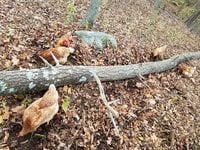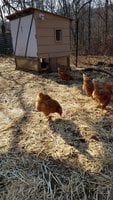- Jun 28, 2011
- 39,160
- 27,424
- 1,302
Chickens are omnivorous and when given the chance, will happily devour a surprising assortment of bugs and small animals. I've seen mine eat frogs, small snakes, mice… Most of us prefer to be a bit less adventurous when meeting our flocks' craving for meat and stick to providing things like mealworms, crickets, roaches, etc. This week I would like to hear your thoughts and practices on feeding "live" treats. What do you offer your flocks, what can you feed them safely, etc?For a complete list of our Topic of the Week threads, see here:
https://www.backyardchickens.com/a/topic-of-the-week-thread-archive
Last edited by a moderator:



 It was like feeding time at jurassic park. They were fighting over them and ripping them to pieces. Some were swallowed whole. We (the kids) thought it was the coolest thing we had ever seen. Our mom, however, was horrified and would not eat eggs that weren't from the grocery store after that. That was the day I became fascinated with chickens. These are not just birds... They are my own little private flock of feathered DINOSAURS.
It was like feeding time at jurassic park. They were fighting over them and ripping them to pieces. Some were swallowed whole. We (the kids) thought it was the coolest thing we had ever seen. Our mom, however, was horrified and would not eat eggs that weren't from the grocery store after that. That was the day I became fascinated with chickens. These are not just birds... They are my own little private flock of feathered DINOSAURS.


